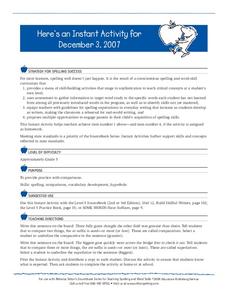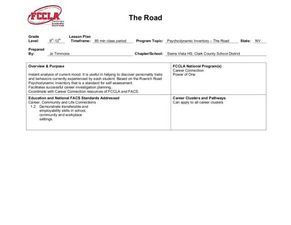Curated OER
Teaching About Genocide
Students can find that genocide is a prevalent theme in world history.
Curated OER
A Conservative Era
In this Conservative Era worksheet, learners write definitions for six terms, examine five pairs of sentences then determine which one is false, then link two sets of words together by identifying which historical theme they share in...
Curated OER
Messages in Art Work
Observe images and discuss what messages they convey. In this critical thinking lesson plan, students determine whether works of art are trying to persuade their audience. They also consider the media and how they communicate messages to...
Curated OER
Native American Culture
Learners read a variety of Native American Literature and discuss the main idea by answering critical thinking questions about the poem. Students use context clues to understand the feeling of the Native American culture about the Earth....
Curated OER
Is there a stone in my soup?
Students observe teacher's inappropriate classroom procedures such as tattling, pushing, or interrupting. In this showing respectful behaviors lesson, students respond to scenarios created by the teacher and address what the appropriate...
Curated OER
Anti-Slavery and Reform-Related Sources
Fifth graders use primary sources to explore events witnessed by ordinary people. In this primary documents lesson, 5th graders answer critical thinking questions based on their documents. Students recognize the...
Curated OER
Rhythm & Improv: Jazz & Poetry
Students analyze the elements of poetry and jazz. In this critical thinking skills lesson, students take a closer look at the rhyme, rhythm, alliteration, form, free verse, lyricism, and imagery that exist is jazz as well as poetry.
Curated OER
A Christmas Carol Exploration
Seventh graders explore the history of Christmas by researching classic literature. In this holiday lesson, 7th graders read the story A Christmas Carol and discuss the tone of Charles Dickens' classic literary work. Students answer...
Curated OER
Lesson Plan 2: Good Novel, Bad Novel
What are the characteristics of a good piece of writing? What makes a story interesting? Give your pupils a chance to define the qualities of good novels and what they see as the qualities of bad novels. Class members record these...
Curated OER
Comparisons
Fifth graders complete a worksheet. In this comparison lesson plan, 5th graders view sentences and identify the comparatives in them. Students complete a worksheet on comparisons.
Curated OER
The Road
Use psychodynamic theory as a part of analyzing a career cluster.The class defines vocabulary words, brainstorms a list of career traits, and completes an online career analysis inventory. They analyze 5 concepts of psychodynamic...
Curated OER
I Am, Am Not! Project
Get your class writing with this project idea. Kids choose two pictures of objects that are like them and two pictures of objects that are not like them to entice their readers. Then, they write an informative paragraph describing each...
Pearson
Lesson Plan: Introduction to Plato’s Cave
Can we perceive reality or are we chained by preconceptions that limit our vision? Plato’s allegory “The Cave” serves to introduce nascent philosophers to Plato’s dialogues and hopefully to engender a love of ideas and discourse. A...
Reed Novel Studies
Fahrenheit 451: Novel Study
Fahrenheit 451 depicts firemen like never before ... rather than putting out fires, they start them! Scholars read to understand why firemen now burn books. As they read, they work through two vocabulary activities, answer 10...
Reed Novel Studies
Freak The Mighty: Novel Study
They say when you are told something enough times, you eventually begin to believe it's true. Sadly, Max in Freak The Mighty believed he was stupid and dumb, so he learned to be alone. That changed when he met another outcast, Freak....
Reed Novel Studies
What Katy Did: Novel Study
What doesn't break you
makes you stronger. Katy, in What Katy Did, learns this lesson the
hard way. After a terrible accident and a long recovery, Katy becomes what she always wanted to be—good and kind. Scholars learn
about Katy's...
Reed Novel Studies
The Underneath: Novel Study
Do you have a place that makes you feel safe and secure? Ranger, a hound in The Underneath, finds his new friend, a calico cat, and her safe place—underneath a porch. Scholars complete sentences using vocabulary from the novel as they...
Syracuse University
World War I
World War I was known for its gruesome battlefields and horrific injuries. Using photographs from a battlefield surgeon's scrapbook, scholars see first-hand what life was like in the trenches. After creating a timeline of the war using...
ReadWriteThink
What is Poetry? Contrasting Poetry and Prose
Introduce middle schoolers to the different strategies used when reading prose versus poetry. Groups use a Venn diagram and a poetry analysis handout to compare the characteristics of an informational text and a poem on the same...
For the Teachers
Story Strips Sequencing
What happens next? Work on story sequence with a instructional activity that prompts kids to put a story back in order. Additionally, they discuss what would happen if one event was missing from the sequence.
Reading Shakespeare
Shakespeare Literature Circles Role Sheets
Tired of those blank stares after your class reads a particularly complex passage from a Shakespearean play? Help high schoolers untangle that prose with a literature circle activity. Ten different roles prompt class members to focus on...
Penguin Books
A Teacher's Guide to the Signet Classic Edition of William Shakespeare's Othello
Villains populate literature. These dastardly characters serve as a contrast to the hero who they set out to destroy. Iago, the villain of Shakespeare's tragedy Othello, certainly rates as one of the most despicable. Motivated by...
K20 LEARN
Lord of the Flies Unit, Lesson 4: Bad to the Bone
Is the nature of humans inherently good or evil? That is the question scholars consider in the fourth lesson of the Lord of the Flies unit. In a Four Corners activity, they examine statements about human nature and stand by the poster...
Santa Ana Unified School District
The Power of Point of View
Sometimes a whole story can change based on the perspective of the person telling it. Practice identifying and analyzing point of view in various reading passages and writing assignments with a language arts packet, complete with Common...
Other popular searches
- Types of Literary Criticism
- Teaching Literary Criticism
- Literary Criticism Beloved
- 3.0 Literary Criticism
- Literary Criticism Essay
- Writing Literary Criticism
- 30 Literary Criticism
- Gender Literary Criticism























